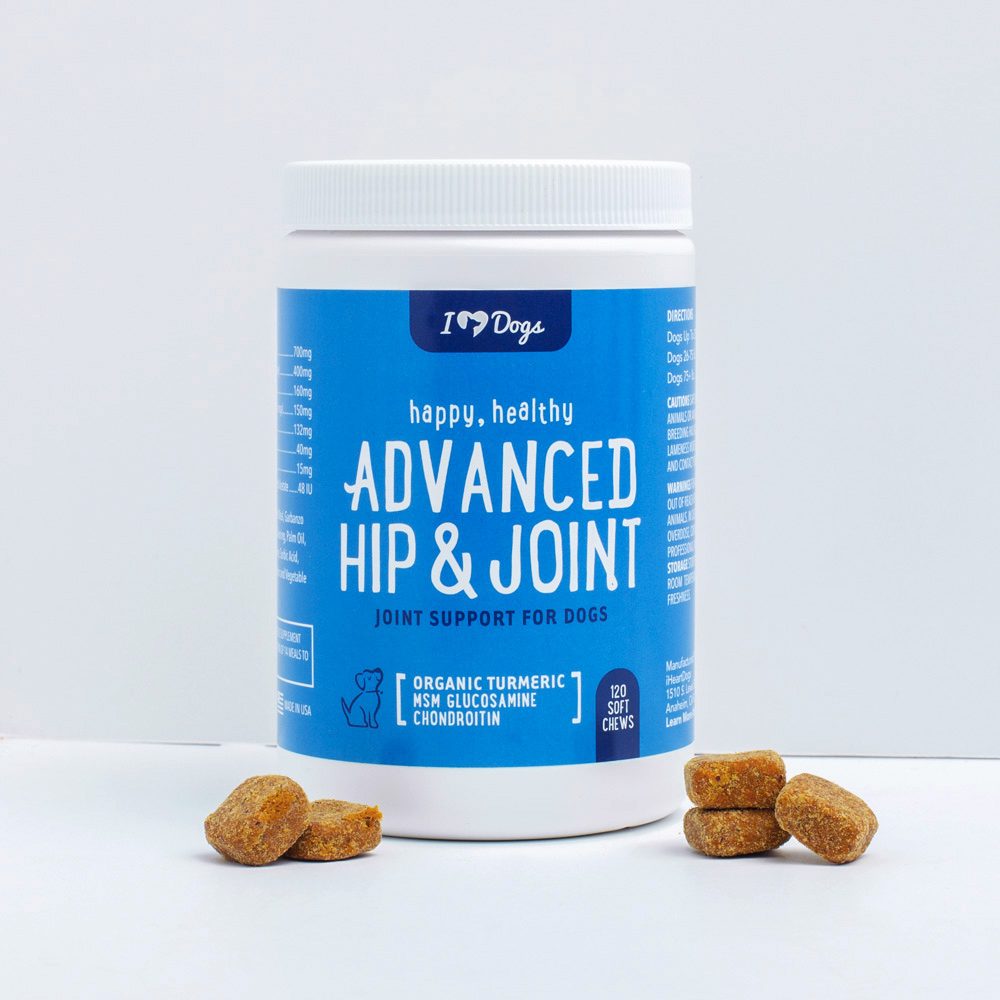
Is your dog beginning to have trouble with everyday activities like rising after sleeping, climbing stairs, and hopping in and out of the car? Pain caused by the degeneration of joint tissue is very common in aging dogs. Sadly, in some larger breeds joint destress can begin at a very young age. While pharmaceutical drugs can offer relief, they also carry the risk of serious side effects leading many vets and pet parents to seek out natural supplements like Glucosamine, Chondroitin and MSM.
The Reason Your Aging Dog Is Slower To Rise
Cartilage – the moist, spongy tissue that cushions the joints – begins to naturally break down as our dogs age. Those that are overweight, have suffered injuries or illnesses, or have certain genetic conditions are at an especially high risk for joint degeneration and pain.
#mc_embed_signup{background:#fff; clear:left; font:14px Helvetica,Arial,sans-serif; }
/* Add your own MailChimp form style overrides in your site stylesheet or in this style block.
We recommend moving this block and the preceding CSS link to the HEAD of your HTML file. */
Receive Our Free Guide: “8 Things Every Dog Owner Must Know About Giving Your Dog a Joint Supplement”
(function($) {window.fnames = new Array(); window.ftypes = new Array();fnames[0]=’EMAIL’;ftypes[0]=’email’;fnames[1]=’FNAME’;ftypes[1]=’text’;fnames[2]=’LNAME’;ftypes[2]=’text’;}(jQuery));var $mcj = jQuery.noConflict(true);
Veterinarians have been recommending glucosamine supplements for their arthritic patients for more than 20 years. Although scientists don’t fully understand how glucosamine works, it appears to activate one of the building blocks of cartilage, as well as stimulate the DNA activity that protects against joint degradation.
The Science Behind Supplementation
In a 2012 examination of several studies involving glucosamine use in humans (research in dogs is limited), researchers concluded that glucosamine sulfate offered “pain relief superior or equal to the commonly used analgesic or nonsteroidal anti-inflammatory drugs (NSAIDs).”
They also noted that these supplements rarely have side effects and expressed the opinion that they could be useful in combination with drugs and other natural products.
According to Arthritis.org, “glucosamine shows anti-inflammatory properties and even appears to help cartilage regeneration.”
Chondroitin sulfate is another naturally occurring substance that has shown promising results in the treatment of arthritis and joint degradation. It is a major component of cartilage that helps it retain water and maintain its spongy, cushioning qualities. Chondroitin is typically derived from shark or bovine cartilage and tends to be used along with glucosamine.
Methylsulfonylmethane or MSM is an organic sulfur containing compound derived from the gas created when microscopic phytoplankton living in the oceans decay. MSM is known for improving joint health with its anti-inflammatory properties. Some researchers believe it is even more beneficial than glucosamine and chondroitin for the treatment of arthritis.
Organic sulfur is imperative for the optimal functioning of each cell, tissue and organ in the body. MSM provides a source of biolgical sulfur which blocks the transfer of pain impulses through the nerve fibers and enhances the activity of cortisol, a natural anti-inflammatory hormone.
The Not-So-New Ingredient Joint Enhancing Ingredient Everyone’s Talking About

Turmeric has been around for ages and taken by humans who’ve benefitted from its anti-inflammatory and joint enhancing properties. Only recently however, has it become more popular among pet parents. Some brands of joint care are beginning to combine the old classics (Glucosamine, chondroitin, and MSM) with turmeric for an even greater effect. Turmeric, glucosamine, chondroitin and MSM can be found combined into one product, providing convenience and saving money.
Should you decide to try these supplements with your dog, be sure to allow several weeks for improvements to be seen. Veterinarians recommend evaluating the effects of these treatments after your dog has been taking them for about three months.
When should I start my dog on a joint supplement routine?
The ideal time to start your dog on a routine is before signs of joint distress. This could be as early as 3 years old for some breeds. Other breeds benefit by starting supplementation when they reach their senior years, around ages 5-9. However, if your dog is already showing signs of aging joints, its not too late to see improvements through the use of supplementation, as well as proper diet and exercise.
If supplementation with glucosamine, chondroitin, and MSM makes sense for your dog, we’d encourage you to try our Happy, Healthy line of advanced canine joint supplements, click here. We spent over 6 months developing what we believe to be the most well rounded and potent canine joint care product on the market. And like all of our products, each purchase provides healthy meals for shelter dogs waiting for their forever homes!
These statements have not been evaluated by the Food and Drug Administration. This product is not intended to diagnose, treat, cure, or prevent any disease. The information on this website is not intended to replace a one-on-one relationship with a qualified health care professional.

 Toledo, United States.
Toledo, United States.